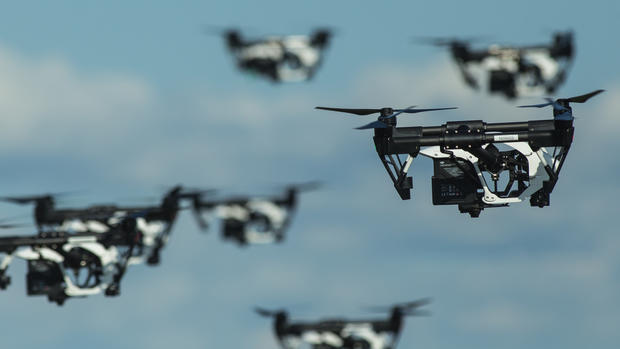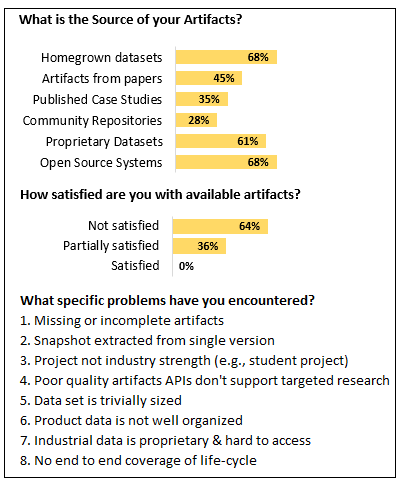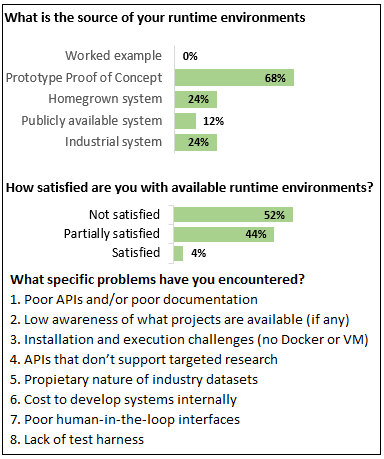What is Dronology?
Dronology is an extensible java/python framework under development at the University of Notre Dame, for coordinating the flight of virtual and/or physical drones. We are using it to support our own research in safety assurance, runtime monitoring, and autonomy. More importantly, it is designed to provide a case-environment for other researchers engaged in diverse areas of Software Engineering research for Cyber-Physical Systems. Visit our Dronology website to learn more about this project.
We currently have released initial sets of Dronology artifacts here and have shared our entire runtime environment with several research groups upon request. Please contact us if you have questions.
Support for Software Engineering Research
 Many critical challenges facing cyber-physical systems
today can be categorized as Software
Engineering problems. Systems must evolve safely over multiple design-time releases and
have the ability to preserve and optimize their operations at runtime despite uncertainty, resource
variability, changing environmental needs, unanticipated faults, and malicious attacks.
Software and System requirements play a non-trivial role in attaining these goals and as a result
researchers are tackling diverse problems related to goal modeling, requirements completeness,
runtime requirements adaptation, managing requirements uncertainty, design-time evolution
of requirements, environmental assumptions, safety assurance cases, and security and privacy
requirements, to name a few. However, Software Engineering research cannot be conducted
in a vacuum. To be effective, it must be driven by case studies of real-life systems and problem
domains. Data from these case studies can be used to illustrate problem scenarios, motivate new and
innovative ideas, explore alternate solutions, and support empirical investigations. For example,
researchers investigating runtime adaptation need case projects that include sufficiently detailed
requirements specifications from which to build goal-models with links to source-code features; while
researchers investigating evolution of safety-cases need project data that includes requirements,
source code, and artifacts of safety analysis. The Dronology Project aims to provide this environment.
Many critical challenges facing cyber-physical systems
today can be categorized as Software
Engineering problems. Systems must evolve safely over multiple design-time releases and
have the ability to preserve and optimize their operations at runtime despite uncertainty, resource
variability, changing environmental needs, unanticipated faults, and malicious attacks.
Software and System requirements play a non-trivial role in attaining these goals and as a result
researchers are tackling diverse problems related to goal modeling, requirements completeness,
runtime requirements adaptation, managing requirements uncertainty, design-time evolution
of requirements, environmental assumptions, safety assurance cases, and security and privacy
requirements, to name a few. However, Software Engineering research cannot be conducted
in a vacuum. To be effective, it must be driven by case studies of real-life systems and problem
domains. Data from these case studies can be used to illustrate problem scenarios, motivate new and
innovative ideas, explore alternate solutions, and support empirical investigations. For example,
researchers investigating runtime adaptation need case projects that include sufficiently detailed
requirements specifications from which to build goal-models with links to source-code features; while
researchers investigating evolution of safety-cases need project data that includes requirements,
source code, and artifacts of safety analysis. The Dronology Project aims to provide this environment.
Project Leadership
- Jane Cleland-Huang, Professor, University of Notre Dame, USA
- Michael Vierhauser, Researcher, Johannes Keppler University, Austria
Selected Publications
- Jane Cleland-Huang, Michael Vierhauser, Sean Bayley: Dronology: an incubator for cyber-physical systems research. ICSE (NIER) 2018: 109-112
- Michael Vierhauser, Sean Bayley, Jane Wyngaard, Wandi Xiong, Jinghui Cheng, Joshua Huseman, Robyn R. Lutz, Jane Cleland-Huang, Interlocking Safety Cases for Unmanned Autonomous Systems in Shared Airspaces, IEEE Transactions on Software Engineering (awaiting publication)
- Michael Vierhauser, Jane Cleland-Huang, Sean Bayley, Thomas Krismayer, Rick Rabiser, Paul Grünbacher: Monitoring CPS at Runtime - A Case Study in the UAV Domain. SEAA 2018: 73-80
- Ankit Agrawal, Seyedehzahra Khoshmanesh, Michael Vierhauser, Mona Rahimi, Jane Cleland-Huang, Robyn R. Lutz. Leveraging Artifact Trees to Evolve and Reuse Safety Cases, International Conference on Software Engineering, 2019, Montreal, Canada.
- Jane Cleland-Huang, Michael Vierhauser: Discovering, Analyzing, and Managing Safety Stories in Agile Projects. RE 2018: 262-273
Funded Projects
- $85,000 CCF-1741781, EAGER: SHF: A Community Case Environment for Empowering Transformative Requirements Engineering Research (June 1st 2017 - May 31st 2018).
- $444,000, CCF-1647342/CCF-1513730 SHF: Medium: RUI: Collaborative Research: Advanced Traceability for Composing Product Line Safety Cases (June 2015 - May 2019) (With PI Robyn Lutz at Iowa State University).

